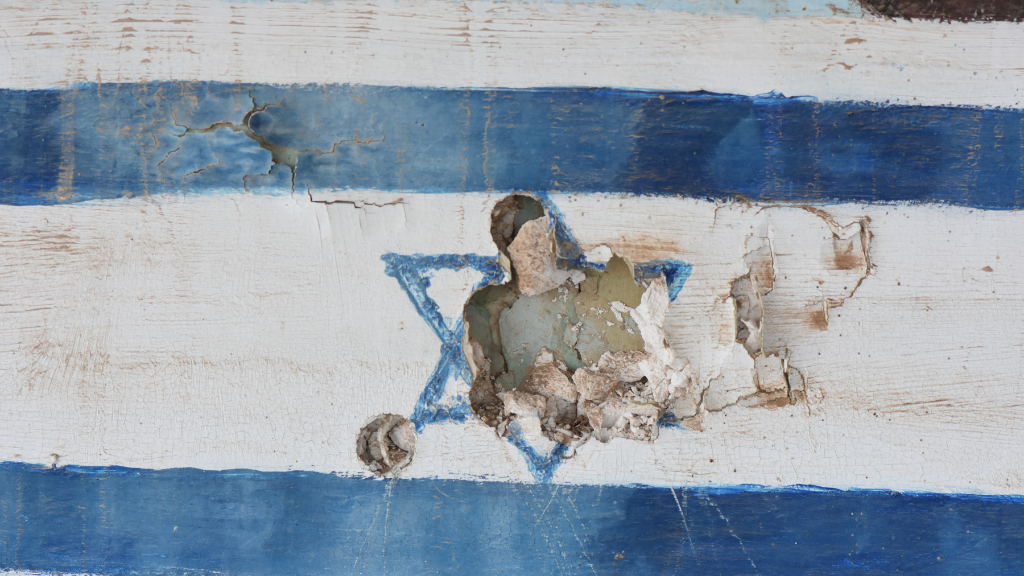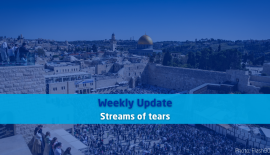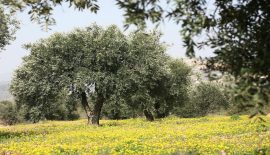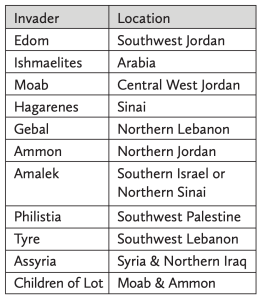Israel at War (3): Prophecy Fulfilled— Psalm 83
Israel is at war. This current conflict is giving sleepless nights to foreign secretaries, military officials, defence contractors and economists. To this, we add another group: Bible prophecy teachers. They are eagerly observing these events to get insight into the future.
Israel—a name used 2,568 times in the Bible[1]—is a prominent subject in the last days (Daniel 9:24), and some of the events surrounding it involve war. There are several armed conflicts to choose from. Psalm 2, Ezekiel 38-39, known as the ‘Gog and Magog’, Zechariah 12 and 14, Revelation 16:16 and Revelation 19, are key end-time military passages.
Psalm 83: The Neighbours are Restless
“They have said, Come, and let us cut them off from being a nation; that the name of Israel may be no more in remembrance”—Psalm 83:4
Our focus will be Psalm 83. The psalmist calls upon God to take action against this neighbouring conspiracy against His people. Their goal is simple: to cut Israel off from being a nation so that its name and memory will be erased. In other words, it is an unprovoked, gratuitous war of annihilation.
Question: Was Psalm 83 Fulfilled Historically, or is it Yet in the Future?
One mandatory requirement is that a nation-state called ‘Israel’ has to be in the promised land during this invasion. The state ceased to exist after the Roman destruction of Jerusalem in 70 AD and was reconstituted in 1948. To the best of our knowledge, nothing in the past fulfilled all the conditions of prophecy. Therefore, we base this article on the premise that Psalm 83 has not yet been fulfilled.
Psalm 83 Invaders
There is a significant nation not listed in the Psalm 83 invasion coalition: Egypt. This is a big omission. It is not as if Egypt is unknown in Scripture; indeed, it is mentioned 611 times in 558 verses in the KJV.[2] Why is Israel’s most important and populous neighbour overlooked? That is an important question but beyond the scope of this article. One guess: the 1979 Israel-Egypt peace treaty stays intact—miraculously.
The 1948 War against Israel involved Egypt, Jordan, Syria, Lebanon, Yemen, Saudi Arabia and Iraq, though the last four nations were barely active. The fact that Egypt fought Israel in 1948 precludes that war from being Psalm 83 —though it could have been a dress rehearsal. In Psalm 83, it appears that every nation that shares a border with Israel is part of the invasion force, except for Egypt.
As we consider the plausibility of a Psalm 83 invasion happening in our lifetime, consider this: the historic Abraham Accords of 2020 gave Israel peace treaties with Morocco, Bahrain, the United Arab Emirates, and Sudan. Saudi Arabia is waiting to make peace, too. Yet, despite this breakthrough of peace and moderation, Israel’s enemies today are as ferocious and dangerous as ever, particularly Iran and its Lebanese proxy Hezbollah. If the current conflict is prolonged, more Arab nations will turn against Israel. This means a Psalm 83-style invasion is more possible.
What is the result of this unprovoked spontaneous invasion of Israel? The text does not say; however, it offers this curse:
“Do unto them as unto the Midianites; as to Sisera, as to Jabin, at the brook of Kison: Which perished at Endor: they became as dung for the earth. Make their nobles like Oreb, and like Zeeb: yea, all their princes as Zebah, and as Zalmunna: Fill their faces with shame; that they may seek thy name, O Lord. Let them be confounded and troubled forever; yea, let them be put to shame, and perish: That men may know that thou, whose name alone is Jehovah, art the most high over all the earth.” Psalm 83:9-11; 16-18 (KJV)
In summary, Psalm 83 involves a coordinated last-day invasion of Israel by its neighbours, minus Egypt. How does Psalm 83 fit into the bigger prophetic picture? One possible outcome is that the neighbours invade and lose the war. They are thus put out of military action. This allows for the Gog and Magog scenario with a secondary ring of nations joining a coalition to destroy the Jewish state.
Prophetic Hope
There is a redemptive side to Psalm 83. The last verse is a prayer asking that all involved will know that God alone, named Jehovah, is the Most High over all the earth. As we observe the current unfolding drama in the Middle East, remember that we are called to ‘watch and pray’ (Matthew 26:41; Mark 13:35-37) that the people in the region and nations around the world will come to know the Most High God in their personal lives.
[1] KJV Search Results for ‘Israel’. Blue Letter Bible. Accessed 9 January 2024.
[2] Blue Letter Bible. Dictionary and Word Search for ‘Egypt’ in the KJV’ Blue Letter Bible. 1996-2012. 11 November 2012.






